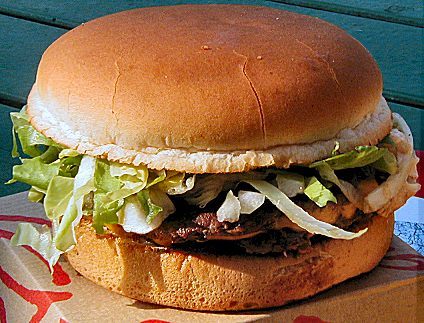Alok Jha
The Guardian
August 5, 2013
The man who has bankrolled the production of the world’s first lab-grown hamburger has been revealed as Google co-founder Sergey Brin. The internet entrepreneur has backed the project to the tune of €250,000 (£215,000), allowing scientists to grow enough meat in the lab to create a burger – as a proof of concept – that will be cooked and eaten in London on Monday.
Brin, a computer scientist who set up Google with university colleague Larry Page, is one of the wealthiest men in the world and has a history of backing projects that sound as though they belong in science fiction movies.
The pair have teamed up with film director James Cameron and others to investigate mining asteroids, and Brin is an investor in the private spaceflight company Space Adventures, which is selling $100m (£65m) trips to the moon. Google is also developing driverless cars and its philanthropic arm, Google.org, has invested in green energy projects.
“It’s really just proof of concept right now, we’re trying to create the first cultured beef hamburger,” said Brin in a film to mark the tasting event in London. “From there I’m optimistic that we can really scale by leaps and bounds.”
The synthetic meat hamburger will be cooked and eaten at an event this afternoon. Among the tasters will be the Chicago-based author of Taste of Tomorrow, Josh Schonwald, and an Austrian food trends researcher, Hanni Rützler of the Future Food Studio.
Brin said that he was moved to invest in the technology for animal welfare reasons. People had an erroneous image of modern meat production, he said, imagining “pristine farms” with just a few animals in them. “When you see how these cows are treated, it’s certainly something I’m not comfortable with.”
Brin’s money was used by a team led by physiologist Dr Mark Post at Maastricht University to grow 20,000 muscle fibres from cow stem cells over the course of three months. These fibres were extracted from individual culture wells and then painstakingly pressed together to form the hamburger that will be eaten in London on Monday. The objective is to create meat that is biologically identical to beef but grown in a lab rather than in a field as part of a cow.
“Cows are very inefficient, they require 100g of vegetable protein to produce only 15g of edible animal protein,” Dr Post told the Guardian before the event. “So we need to feed the cows a lot so that we can feed ourselves. We lose a lot of food that way. [With cultured meat] we can make it more efficient because we have all the variables under control. We don’t need to kill the cow and it doesn’t [produce] any methane.”
Dr Post said that Brin’s team had come to him to back the project. “They had identified this technology as something that would fit their funding goals in terms of environment and animal welfare. They liked my approach and decided to fund it.”
Brin said he wanted to invest in technologies that were “on the cusp of viability. If it succeeds there, it can be really transformative for the world.” He acknowledged that some people would probably think synthetic meat was science fiction. “I actually think that’s a good thing. If what you’re doing is not seen by some people as science fiction, it’s probably not transformative enough.”
If successful, lab-grown meat could become a viable way to tackle the increasing environmental impact of meat consumption around the world. Around 30% of the Earth’s useable surface is already covered by pasture land for animals, compared with just 4% of the surface used directly to feed humans. The total biomass of our livestock is almost double that of the people on the planet and accounts for 5% of carbon dioxide emissions and 40% of methane emissions – a much more potent greenhouse gas.

